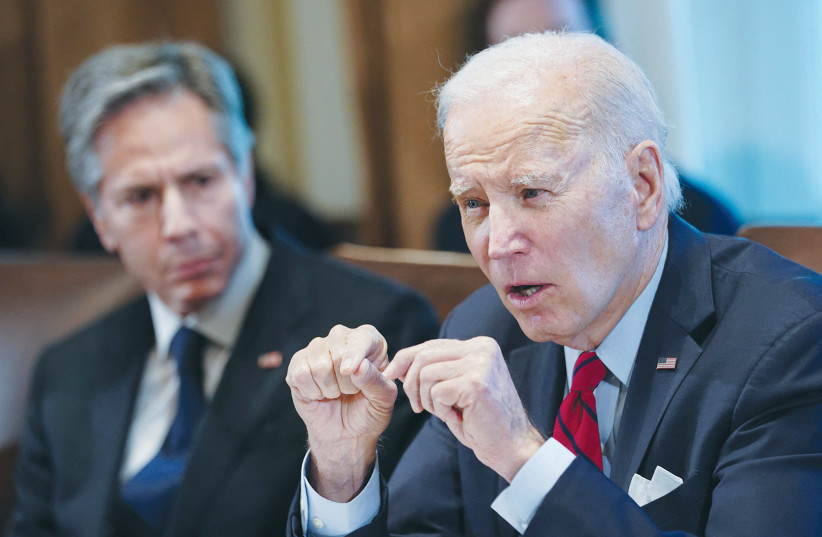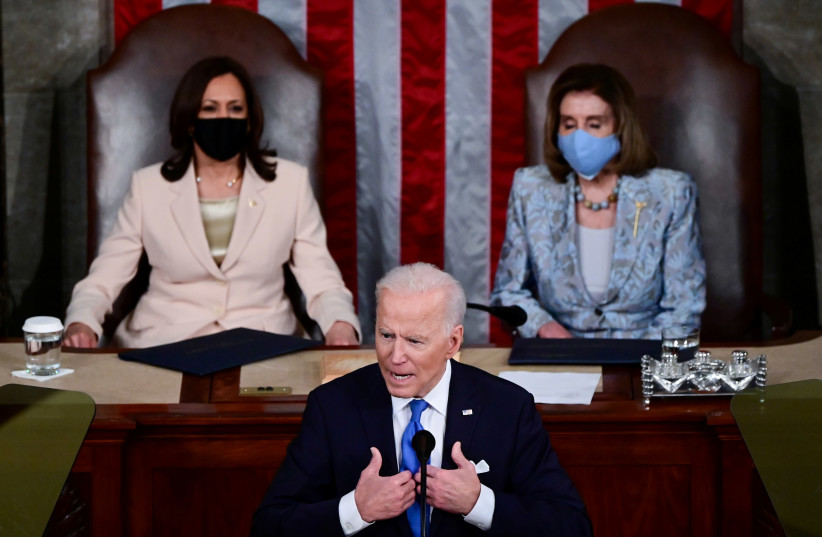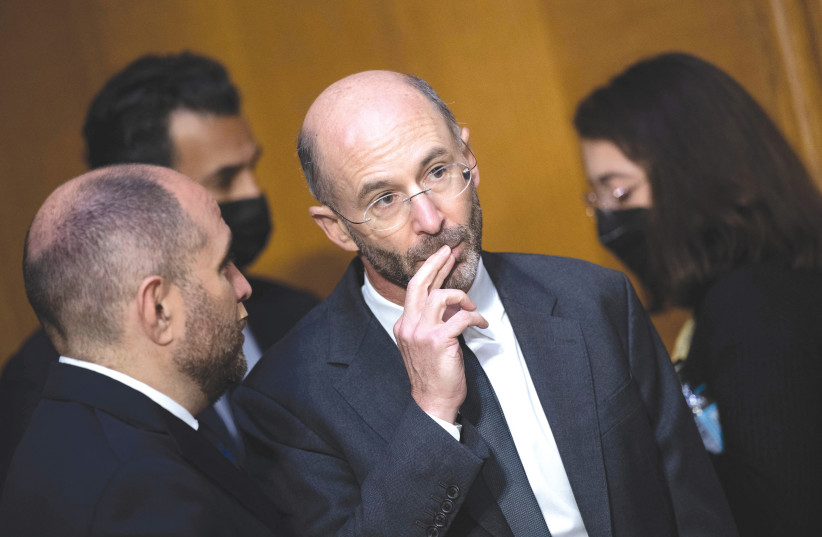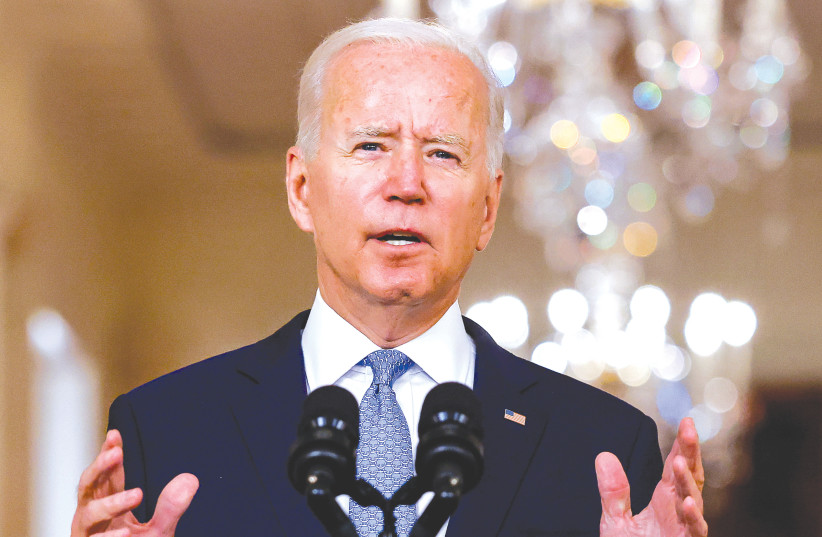Last Friday, US President Joe Biden marked two years in office.
During his inaugural speech, the president who vowed to “repair US alliances” and “engage with the world once again” and stated that “American leadership must meet this new moment of advancing authoritarianism, including the growing ambitions of China to rival the United States and the determination of Russia to damage and disrupt our democracy,” probably did not imagine that his words would be put to the test so quickly, when Russia invaded Ukraine last February.
For good and for ill, the Russia-Ukraine war has defined the Biden foreign policy so far. As the top agenda item, the war has drawn much of the White House’s attention, sometimes at the expense of other issues, such as China.
“From the start of his presidency, Biden signaled openness to serious engagement and negotiation with Moscow, the point being to find ways to prevent precisely the sort of aggression [Russian President Vladimir] Putin has unleashed on Ukraine, and to manage the risks posed by unconstrained conflict with Russia, including the risks of potential nuclear escalation,” said Matthew Rojansky, distinguished fellow at the Wilson Center.
“At the same time, the White House made it clear in public and private channels that if Putin attacked Ukraine, the US response would be swift and severe, sanctions would start high and stay high, and that US support for Ukraine would be unwavering. That has remained consistent US policy in the year since Putin’s February invasion, and is likely to remain so,” he said.

“What will be difficult is finding ways to contain potential spillover and escalation from this conflict,” he continued. “That includes managing nuclear risks, protecting Americans around the world, including bringing home those who have been taken hostage by the Kremlin, and addressing other regional challenges where Russian influence is a factor, such as Iran and Syria.”
Stephen Flanagan, a senior political scientist at the RAND Corporation, who served in several senior positions in government, most recently as special assistant to the president and senior director for defense policy and strategy at the National Security Council from 2013 to 2015, said that the Biden administration “has been highly effective in orchestrating the West’s response to Russia’s war on Ukraine and maintaining cohesion among allies and partners.
“The enormous US and European military and economic assistance to Kyiv and the major steps taken to strengthen NATO’s military posture to deter Russian attacks on allied countries are the most prominent dividends of this deft diplomacy,” he said. “The announcement of the US and German decisions to supply Ukraine with main battle tanks is yet another. There remains strong consensus among Western governments and within the United States to continue to provide Ukraine with what it needs to reclaim occupied territory and deter further Russian attacks.
“Biden has avoided steps that would fracture allied unity and risk escalation into a NATO-Russia war, while making clear that there can be no normalization of relations with Russia absent an end to its aggression in Ukraine.”
China
When Biden took office, China was seen as the main challenge for the US, with a wide range of issues of trade, currency, technology and intellectual property. Two years later, and in the wake of the war in Ukraine, the competing superpower is taking a lower priority.
“Two years into the Biden administration, in spite of crises and challenges such as COVID, Russia’s invasion of Ukraine and a looming global economic slowdown, the political environment in the US on China has severely constrained Biden’s flexibility in dealing with Beijing to try to mitigate the effect of global shocks on the international system,” said Susan A. Thornton, senior fellow and visiting lecturer at Yale Law School’s Paul Tsai China Center.
“We should all hope that Secretary [of State Antony] Blinken’s upcoming visit to China will create more space for cooperation, but the Biden administration appears to be keeping expectations low,” she added.
Grant Rumley, a Washington Institute fellow, said that there is an “admirable consistency across the Trump and Biden administrations’ positions” when it comes to China.

“The lens of ‘great power competition’ trumpeted by the Trump administration has been carried on by the Biden administration, which has repeatedly described China as the US’s greatest challenge moving forward,” he said. “There are plenty of differences in the tactics of each administration, of course, but I think on the whole the fact that this emphasis on China has been internalized by two presidencies of different parties underscores just how seriously the US takes this issue.
“When it comes to great power competition, this administration has made several important strides on top of leading the effort to support Ukraine, such as in forging creative defense opportunities, such as AUKUS, encouraging new multilateral fora, like I2U2, or supporting partners and allies in investing more in defense, like Japan.
“I do think, however, it will be important to remember that competing with China is a global effort and won’t be confined just to the Indo-Pacific,” he said. “The US and its partners should continue working on a consistency of message and effort in order to address the expansion of Chinese influence in places like Africa and the Middle East.”
Palestinians
One issue that was a low priority for the administration was the Israeli-Palestinian conflict. Two years later, it seems like it remains a low priority.
“As expected, in its first two years the Biden administration engaged the Palestinian-Israeli conflict at the operational level, with very little involvement from the political echelon,” said Ghaith al-Omari, a senior fellow in The Washington Institute’s Irwin Levy Family Program on the US-Israel Strategic Relationship. “Even President Biden’s visit to the West Bank was more symbolic than substantive,” he said.
“The administration would prefer to stay the course in the coming two years, both in order to focus on other regional and international priorities, and due to a deep conviction in DC that no progress is likely, given the state of Palestinian and Israeli politics,” he added.
“However, three sets of issues could force a more political engagement by the administration: changes or disturbances on the al-Haram al-Sharif/Temple Mount; accelerated settlement expansion, particularly in areas where such expansion forecloses the possibility of a two-state solution in the future; or a significant deterioration in the security situation in the West Bank.
“The administration is closely monitoring the policies of the new Israeli government on these issues, and they are the subject of ongoing conversations between the US and both Prime Minister [Benjamin] Netanyahu and the PA.”
Jonathan Schanzer, senior vice president at the Foundation for Defense of Democracies, said that the Biden administration began on very rocky footing, “endorsing Hamas participation in Palestinian elections scheduled for spring 2021.”
“The cancellation of that vote led to the outbreak of the 2021 war. Since then, the administration has been more tempered in its policies.”
However, he said, the State Department “continues to look for ways to elevate the Palestinian cause. I would expect this to continue in 2023. The stakes are now higher, though, with whispers of a third intifada in the West Bank. An outbreak of coordinated violence could put the White House in a sensitive spot.”
Iran
When Biden took office, his policy was to try to reenter the 2015 nuclear agreement with Iran. But two years later, the agreement is “not even on the agenda” per the administration Iran envoy, Robert Malley. A video of the president from November 2022 shows him saying that the agreement is “dead,” but many experts believe that this is not the end of the story.
“The administration’s initial Iran policy was a reckless one: pursuing a return to a deal under worse terms,” said Schanzer.

“And the decision to put Rob Malley in charge of that effort was even more cause for concern, given his obsequiousness vis-à-vis the regime,” he said. “Indeed, there was virtually no concession he was unprepared to make. But circumstances have changed, and the White House has altered its approach. For one, the regime has rejected even the most generous offers on the table. Moreover, the regime has sided with Russia in the Ukraine crisis, leaving Biden with few choices but to target Iran with more sanctions.
“Remarkably, the White House has not yet closed the door on a deal,” said Schanzer. “This policy of flexibility, leaving the door open for a renewed deal, lacks moral clarity given Iran’s malign activity in Ukraine and around the Middle East. The regime continues to challenge American interests through word and deed. [The year] 2023 may well be a year of decision, at last, for Biden.”
Dennis Ross, distinguished fellow at The Washington Institute for Near East Policy, said that it is clear that the Iranians are moving their nuclear program forward, “and have essentially reduced their breakout time to close to zero.
“Iran is putting itself in a position where it will have the option to go for a nuclear weapon,” he said. “That is where the current path is leading. Thus, if we want a different result, we will need a different approach. If nothing else, Iran must come to fear that if it stays on its current path, it is risking a military attack that could wipe out its entire nuclear infrastructure.”
Today, he said, “the Iranians don’t seem to believe that we would ever act militarily against their nuclear program. So the issue becomes how to convince them that they are playing with fire. One very good step in the right direction is the massive joint exercise that is currently under way with the United States and Israel – it certainly looks like we are rehearsing the kind of actions we would take if we were to carry out a strike. It is a very clear demonstration of US and Israeli military capabilities.
“Other steps will be needed to convince the Iranians that we mean what we say that if there is no diplomatic outcome, we will act militarily to stop their nuclear program,” he said. “The US needs to respond with a disproportionate military response when our forces in Iraq or Syria are struck by Iranian proxies. Carefully calibrated responses may make sense in isolation, but also signal the Iranians that we are worried about escalation. They need to be the ones worried about escalation, if we are going to deter them and convince [them] that they need to stop their nuclear program’s advance.”
Afghanistan
That botched withdrawal from Afghanistan defined Biden’s first year in office, and many predicted that it would shape his entire term. However, 18 months later, some experts believe that despite its failed execution, the decision to withdraw was the right one.
“One can debate the decision on withdrawal [from] Afghanistan,” said Ross. “President Biden was right that if we kept 3,000 forces there, after 20 years we would never be able to withdraw – there would always be a reason to stay.
“The issue with the withdrawal was the way the decision was implemented,” he said. “It was as if we had one objective – getting our forces out safely as we drew them down, and their smaller numbers made them more vulnerable. This was a completely legitimate and a necessary objective. The problem is that it was not the only objective; we had obligations to those Afghans who worked with us, fought with us, and were all over the country and not only in Kabul,” said Ross. “We had to have plans for getting them out, and that meant that our forces had to stay there long enough to fulfill that mission. Instead, we had a plan that pulled the military out before we evacuated the civilians, and by definition that created a problem. The chaotic nature of the withdrawal created a misimpression about the US and whether could it be counted on.

“The Biden administration has recouped its image in many respects and demonstrated it has learned many lessons about effective statecraft with the way it has mobilized our allies to help Ukraine blunt Russia’s war of aggression. President Biden has made clear we will not let a larger nation erase its neighbor, and there will be a rules-based order and not one where might makes right.”
Mike Pregent, a senior fellow at the Hudson Institute, said that “the Afghanistan failure sent a clear signal to our adversaries that they can get all they can while Biden is in the White House.
“Russia followed the Afghanistan disaster with their invasion of Ukraine, and China increased their threats against Taiwan and any US actions to defend against an invasion,” he said.
“The Afghanistan collapse gave the Taliban and the Haqqani network, both al-Qaeda allies, forever control of Afghanistan,” Pregent continued. “The message it sent to our allies and our enemies is clear – allies cannot trust the lifespan of US commitment and resolve, and our adversaries can exploit the permissive environments of election outcomes they favored.”
